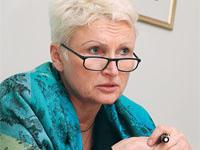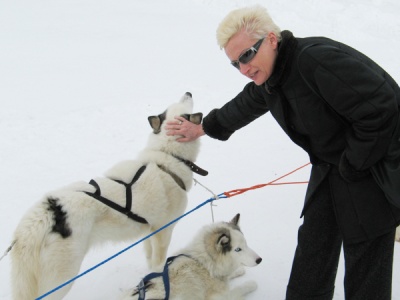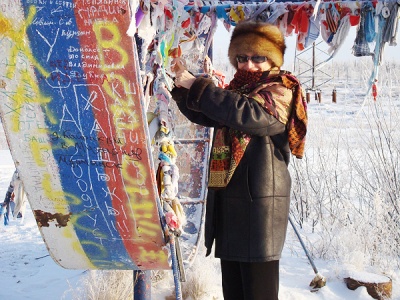 |
Home page / News & Analysis
/ Latest news
/ Germany continues to see a promising future for doing business in the Urals
|
|
|
Germany continues to see a promising future for doing business in the Urals
19.12.2011 — Analysis The economic crisis that took its toll on the global economy raised doubts about the prospects of growth for international economic cooperation. But the German Consul General in Ekaterinburg, Dr. Renate Schimkoreit, assured RusBusinessNews that the partnership between Russia and Germany is still going strong. The most compelling evidence of this is found in the steady increase in the number of German visas issued in the Urals. - Dr. Schimkoreit, the European Union has hit a rough patch recently and the financial crisis seems to be deepening. What overall effect will this have on the economic partnership between Germany and the Ural regions of Russia? - You're right. The current situation in the European Union, or more precisely, in the euro zone, is not entirely positive. However, the statements made at the EU-summit in Brussels, 7th to 9th of December, as well as the proposals put forward by German Chancellor Angela Merkel, give us some reason for hope. Although we need to understand that only time will tell whether the current suggestions for overcoming the global economic crisis will be effective. And that could take months or even years. But I don't sense any negative attitudes here regarding the future of the continued growth of economic ties between Germany and Russia or between Germany and the Urals. Definitely there will not be any retrenchment. German production levels have not fallen since the economic crisis and our companies are in a very good position. All business contracts with the Urals remain of course valid and Russian investment in gErmany is also most welcome. - Europe, and Germany in particular, has many well-trained economists. Did any of those experts have any inkling that the euro zone would suffer such a blow? - In German, as in Russian, we have the proverb, "Hindsight is 20/20." Many German politicians are now saying that the agreements reached in the European Union regarding the introduction of a single currency needed to be reexamined. In particular, we lost the opportunity to exercise control, specifically by applying sanctions to the countries that are not working to ensure their own stable economic development when formulating their budgets. Now some needed changes are going to be made to those agreements, which will allow the EU member states to take specific measures to address that sort of noncompliance. Despite the fact that these decisions were only made a few days ago, the need for them began to surface during the most recent crisis, which has been going on for almost a year and a half. At the moment I can't say how everything will be regulated or what the ultimate result will be. You asked me if there were any portents of the current crisis. In a very meaningful way, it is closely tied to the global crisis of 2007-2008. That previous crisis seriously rattled some European countries, such as Greece, that were already a bit unstable. - Could it all be summed up by saying that all nations need to learn to live within their means? - That's a good insight. But first we have to achieve a certain level of stability. - Has the crisis affected the number of visas issued by the German General Consulate in Ekaterinburg? - The number of visas we issue continues to climb, despite the economic crisis. Previously, over the course of a year we would see periods when there was a real rush of demand and then slower times, but now the demand for German visas each month has stabilized. We issued more than 37,000 visas in 2011. - And staying on the subject of visas - Italian officials are now actively campaigning to abolish the visa restrictions between Russia and the countries in the Schengen Area. One suggestion is to issue future visas that would be valid for longer periods... - We agree with that approach. We're trying to make the procedure for obtaining a visa as convenient as possible, while abiding by agreements with our Schengen partners, naturally. - Going back to the question of the economy. The German pharmaceutical company Bayer has begun working with the Urals pharmaceutical cluster. What will be the basis of this cooperation and what does the German company find of interest in the Urals? - I'm happy that the Urals and Germany have agreed to work together in such a highly specialized field as pharmaceuticals. I hope that this bilateral cooperation will continue on this stable course. The German General Consulate has helped to support these business contacts. Several meetings were held in our premises between representatives of Bayer and the Russian participants in the Urals Pharmaceutical Cluster noncommercial partnership. - You recently visited Yamal, a region that is interesting to Germany on many fronts. On one hand, of course, Yamal is on the Arctic shelf and has natural gas deposits, on the other hand, there's the issue of agricultural cooperation... - That region made a really unforgettable impression on me. Of course, most people only see Yamal as a supplier of energy, but there are also other important minerals there. But mining them is quite expensive. And there are other opportunities the region could pursue, in addition to supplying Europe with energy and venison. The governor of the Yamalo-Nenets district, Dmitry Kobylkin, showed me the region's short- and medium-term development program, which focuses on building a modern infrastructure. That primarily means creating a comfortable life for the people who live in the extreme climatic conditions of the Far North.
In Salekhard, I saw how they're careful to ensure that construction work in the city uses modern building materials that can stand up to the harsh climate. The developments in the region's transportation infrastructure are important and far-reaching, and include the plans being pursued as part of the Ural Industrial - Ural Polar project. I was also impressed by the scope of the work to promote health care in Yamal. Despite the fact that the population there is widely geographically dispersed, the government of the district is setting up a system that provides medical services accessible to the majority of these northern residents. At the Green Week exhibit that will be held in January, 2012 in Berlin, the region intends to expand its existing business contacts in agriculture (in 2011 Yamal supplied 160 tons of venison to Germany worth one million euros - Ed.) In addition to venison, Yamal has successfully begun to manufacture fish products, the quality of which are very competitive with those already on the European market.
- The question of the environment always comes up during any discussion of energy and energy resources, especially when taking Yamal as an example. In that context I'd like to talk about the November forums that were held in Ekaterinburg, devoted to environmental and energy issues. What was the outcome of those forums? - The two forums were separate events, and the one that focused on the environment was organized by the Chelyabinsk international trade center. The Russian-German energy forum was held at the initiative of the Russian-German Energy Agency (RUDEA) and the Deutsche Energie-Agentur (DENA), which are conducting a pilot project on energy conservation in Ekaterinburg and the Sverdlovsk region. It's difficult for me to judge the outcome of the energy forum, but the environmental forum has already seen some practical follow-up. One of the participants in the forum was a representative of the municipal government of the German city of Duisburg. I should point out that Ekaterinburg and Duisburg are very similar in the environmental aspect. Both cities have a lot of heavy industry and have to deal with the problem of industrial emissions. Duisburg has made somewhat more progress on environmental issues than their counterparts in the Urals, and so it is prepared to share some of its experience. Negotiations on this topic have been held with the government of Ekaterinburg, and I think we'll see further practical developments resulting from these discussions. - Another landmark event was held in Ekaterinburg in November - the first international festival celebrating the culture of Russian Germans. Where did the idea for this festival come from and was it well received? - The representatives of the German diaspora in the Urals are very active, especially in Ekaterinburg, Tyumen, Chelyabinsk, and Nizhny Tagil. Many of them are young people, nowadays. They've been educated in Russia and are strongly rooted here, but they haven't forgotten their German culture and traditions. They are a real bridge between Russian and German cultures. This festival was the first in the Urals, more will follow. We need more of these positive events.
Interviewed by Valentina Mazharova |
| Regions | Project participants | Investment projects | Consulates and Trade Offices | News and Analysis | About the Project |
|
© RusBusinessNews, 2009. All rights reserved. Establishing a hyperlink to RIA RusBusinessNews is required for using any of the material published on this website. News and analytical reviews are translated into foreign languages by the TRANSLIT Translation Agency |
«Sum of technologies»® Web design Site promotion |

